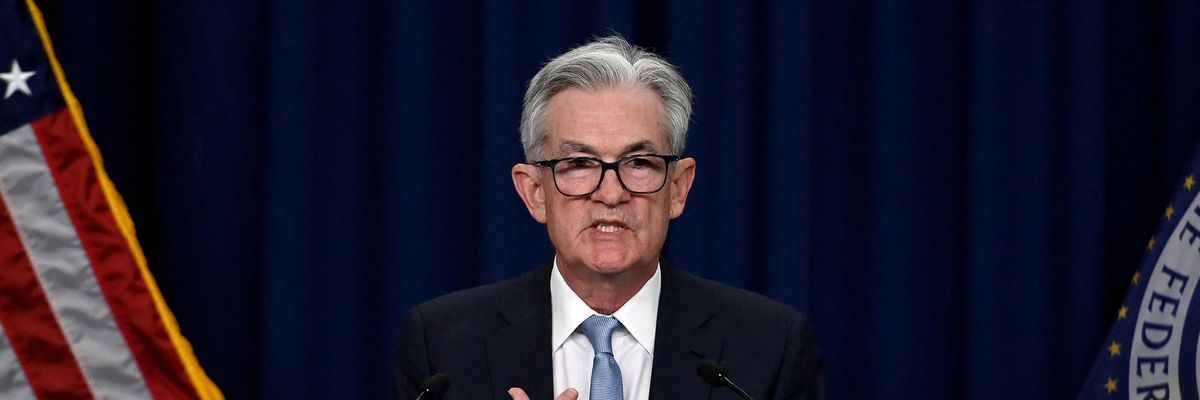New Labor Department data published Friday showed that U.S. job growth surged to 528,000 last month, defying analysts' expectations of a slowdown and deepening concerns that the Federal Reserve will continue hiking interest rates in its bid to curb inflation.
The better-than-predicted hiring and the slight uptick in wage growth after months of deceleration increase the likelihood that the central bank will impose its third consecutive 75-basis-point interest rate boost in September, despite warnings that the Fed's effort to cool economic demand and rein in prices could induce a damaging recession and mass unemployment.
"A recession caused by the Fed raising rates too aggressively would undo a great deal of the enormous gains that have occurred in the current recovery."
Heidi Shierholz, president of the Economic Policy Institute (EPI), said Friday that while the new jobs figures show that "we're almost surely not in a recession now, the Fed may have already overshot and secured a recession in coming months" as rate hikes slowly work their way through the economy, slashing investment by making borrowing more expensive.
"Regardless, they should slow the pace of rate increases substantially and be ready to go into neutral or even cut rates," Shierholz argued. "A recession caused by the Fed raising rates too aggressively would undo a great deal of the enormous gains that have occurred in the current recovery."
Fed chair Jerome Powell has publicly admitted that rate hikes are not likely to impact key drivers of record-high inflation such as gas and food prices, leading lawmakers and economists to caution that the central bank is risking a recession and huge job loss for no reason.
The Fed chief has conceded that the central bank's actions could push the U.S. into recession, though he has said that is not policymakers' intention.
"The Fed's single tool for fire-fighting--interest-rate increases--is aimed in the wrong direction," former U.S. Labor Secretary Robert Reich wrote in an op-ed for The Guardian after the Fed's latest policy meeting on July 27. "It's hitting working people rather than corporations responsible for most price increases (over and above the rising costs of global supplies)."
"We need to fight rising prices, not working people," Reich added, arguing that corporate greed is primarily to blame for surging inflation.
Related Content
Progressives Rip Corporations for 'Using Inflation as a Cover Story to Jack Up Prices and Pad Profits'
Jake Johnson
Despite mounting recession concerns stemming from the Fed's actions and fresh evidence of slowing economic growth, U.S. central bankers have provided no indication that they plan to stop raising interest rates any time soon.
Mary Daly, the president of the Federal Reserve Bank of San Francisco, told the New York Times earlier this week that the central bank is "nowhere near almost done" hiking rates, a sentiment that other officials echoed.
But experts have stressed that inflation is hardly just a U.S. problem, pointing to global supply chain snags caused by the pandemic and major energy market disruptions from Russia's war on Ukraine--price pressures that the Fed can do nothing about.
"Rather than the specific policies of the Biden administration driving inflation, the roots of today's inflation are a more complicated cocktail of other forces: from the spike in raw material, energy, and commodities prices due in large part to the Russian invasion of Ukraine, to lingering supply chain disruptions and distorted consumer demand patterns stemming from the pandemic," EPI's Josh Bivens, Asha Banerjee, and Mariia Dzholos wrote in a blog post on Thursday.
"This is not an academic exercise or simply providing political cover for any particular policymaker," they added. "Instead, there is real economic danger from misdiagnosing the inflation problem. An engineered, unnecessary recession will only cause more economic pain to those still just recovering from the Covid-19 recession, and will undercut the strong economic recovery underway."
Instead of potentially recessionary rate hikes, economists and Democratic members of Congress have called for legislation to tackle sky-high prescription medicine prices, housing costs, and child care expenses.
Senate Democrats are on the verge of passing the Inflation Reduction Act, compromise legislation that would modestly cut drug costs for Medicare recipients.
Overall, according to a group of nearly 130 leading economists, the bill would put "downward pressure on inflation."


